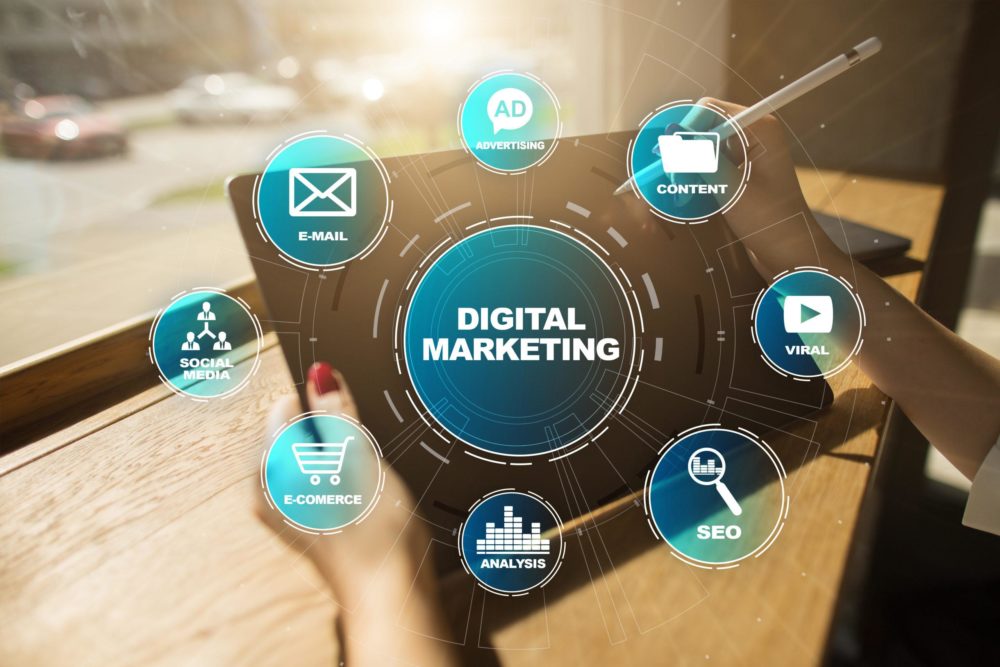In today’s digital age, businesses are increasingly relying on online platforms to reach their target audience and drive growth. As a result, the demand for skilled digital marketers has skyrocketed.
To meet this demand, educational institutions have developed comprehensive digital marketing degree programs that equip students with the knowledge and skills needed to excel in this rapidly evolving field. In this article, we will explore the importance of digital marketing degree programs, the key components of these programs, and the career prospects for graduates.
1. Understanding Digital Marketing

1.1 What is Digital Marketing?
Digital marketing encompasses a broad range of strategies and techniques used to promote products or services through various online channels. It involves leveraging digital platforms such as websites, social media, search engines, email, and mobile apps to connect with potential customers and generate leads. Digital marketers employ data-driven tactics to optimize campaigns, target specific demographics, and measure the effectiveness of their marketing efforts.
1.2 Why is Digital Marketing Important?
Digital marketing has become indispensable for businesses of all sizes. It offers a cost-effective way to reach a vast global audience, enables precise targeting, provides measurable results, and facilitates real-time engagement with customers. As a result, organizations are increasingly investing in digital marketing professionals who possess the skills to navigate this complex landscape and deliver tangible results.
2. The Role of Digital Marketing Degree Programs

2.1 Comprehensive Curriculum
Digital marketing degree programs offer a comprehensive curriculum that covers all aspects of online marketing. Students learn about search engine optimization (SEO), social media marketing, content marketing, paid advertising, email marketing, web analytics, and more. The curriculum is designed to provide a holistic understanding of the digital marketing ecosystem and equip students with practical skills that can be applied in real-world scenarios.
2.2 Practical Training
One of the key advantages of digital marketing degree programs is the emphasis on practical training. Students have the opportunity to work on live projects, develop campaigns, and analyze data using industry-standard tools and software. This hands-on experience enables them to bridge the gap between theory and practice and prepares them to tackle real-world challenges in their future careers.
2.3 Industry Expertise
Digital marketing degree programs are often taught by industry professionals who have extensive experience in the field. These instructors bring valuable insights and perspectives, sharing their firsthand knowledge of industry trends, best practices, and emerging technologies. Such exposure to industry expertise not only enhances students’ learning but also helps them build a professional network that can be beneficial for their career advancement.
3. Career Prospects

3.1 Diverse Job Opportunities
A digital marketing degree opens up a wide range of career opportunities. Graduates can pursue roles such as digital marketing manager, social media strategist, SEO specialist, content marketer, email marketing manager, digital advertising analyst, and more. The demand for digital marketing professionals spans across industries, including e-commerce, technology, advertising, media, healthcare, and finance, providing graduates with a diverse set of options to choose from.
3.2 Competitive Advantage
In a highly competitive job market, a digital marketing degree can give candidates a significant advantage. Employers recognize the value of formal education in digital marketing, as it demonstrates a candidate’s commitment to acquiring specialized knowledge and skills. A degree also serves as proof of the candidate’s ability to adapt to the rapidly changing digital landscape, making them more attractive to potential employers.
3.3 Lucrative Salaries
Digital marketing professionals are in high demand, and their salaries reflect this demand. According to industry reports, individuals with a digital marketing degree earn competitive salaries compared to their counterparts in other marketing disciplines. The salary range varies based on factors such as job role, years of experience, location, and the size of the organization. However, digital marketing professionals can expect to earn a lucrative income and enjoy potential career growth as they gain more expertise and experience in the field.
4. Choosing the Right Digital Marketing Degree Program

4.1 Accreditation and Reputation
When selecting a digital marketing degree program, it is crucial to consider the accreditation and reputation of the educational institution. Look for programs that are accredited by recognized accrediting bodies to ensure that the curriculum meets high academic standards. Additionally, research the reputation of the institution and the program itself by considering factors such as faculty qualifications, industry partnerships, and alumni success stories.
4.2 Curriculum Flexibility and Specializations
Digital marketing is a dynamic field that continuously evolves with emerging technologies and trends. Therefore, it is beneficial to choose a degree program that offers flexibility in its curriculum, allowing students to adapt to the changing landscape. Look for programs that cover a wide range of digital marketing strategies and techniques, as well as offer opportunities for specialization in areas of interest, such as social media marketing, data analytics, or e-commerce.
4.3 Practical Learning Opportunities
Hands-on experience is invaluable in digital marketing education. Look for programs that provide practical learning opportunities, such as internships, capstone projects, or cooperative education programs. These experiences allow students to apply their theoretical knowledge in real-world settings, build a portfolio of work, and develop crucial skills that are highly sought after by employers.
4.4 Industry Connections and Networking
The digital marketing industry thrives on networking and connections. Consider programs that have strong industry connections and provide networking opportunities, such as guest lectures, industry events, or alumni networks. These connections can open doors to internships, job opportunities, and mentorship, enhancing your career prospects and professional development.
As businesses increasingly rely on digital channels to connect with customers, the demand for skilled digital marketers continues to grow. Digital marketing degree programs offer a structured and comprehensive approach to acquiring the knowledge and skills necessary to excel in this field. By providing a solid foundation in digital marketing strategies, practical training, industry expertise, and career-focused opportunities, these programs prepare graduates for diverse and rewarding career paths. If you have a passion for marketing, technology, and creativity, pursuing a digital marketing degree may be the key to unlocking a successful and fulfilling career in the digital era.
5. The Future of Digital Marketing

5.1 Emerging Technologies
The digital marketing landscape is constantly evolving, driven by advancements in technology. As a digital marketing professional, staying updated with emerging technologies is crucial to stay ahead of the competition. Some of the emerging technologies shaping the future of digital marketing include artificial intelligence (AI), machine learning, chatbots, voice search, virtual reality (VR), and augmented reality (AR). Digital marketing degree programs that incorporate these emerging technologies into their curriculum provide students with a competitive edge in the job market.
5.2 Data-Driven Marketing
Data has become the backbone of effective digital marketing campaigns. Analyzing consumer data allows marketers to understand their target audience, personalize marketing messages, and make data-driven decisions. As the amount of data continues to grow, digital marketers who possess the skills to collect, analyze, and interpret data will be in high demand. Digital marketing degree programs often include courses on data analytics and marketing analytics, equipping students with the skills to harness the power of data for marketing purposes.
5.3 Mobile Marketing
With the increasing use of smartphones and mobile devices, mobile marketing has become a critical component of digital marketing strategies. Mobile marketing involves optimizing websites, content, and advertising for mobile platforms, as well as utilizing mobile apps and location-based marketing. Digital marketing degree programs recognize the importance of mobile marketing and provide students with the knowledge and skills to create mobile-friendly experiences and leverage mobile technologies to reach and engage with consumers effectively.
5.4 Ethical and Sustainable Marketing
As consumers become more conscious of ethical and sustainable practices, digital marketers need to adapt their strategies accordingly. Ethical marketing involves promoting transparency, honesty, and fairness in advertising, while sustainable marketing focuses on minimizing environmental impact and promoting socially responsible practices. Digital marketing degree programs that address these topics equip students with the knowledge and tools to develop marketing campaigns that align with ethical and sustainable principles, catering to the evolving consumer preferences.
Conclusion
Digital marketing degree programs play a vital role in preparing students for the fast-paced and ever-evolving digital marketing landscape. By offering comprehensive curricula, practical training, industry expertise, and preparing students for future trends, these programs provide a solid foundation for a successful career in digital marketing. As businesses continue to invest heavily in digital marketing efforts, the demand for skilled professionals will only increase. Pursuing a digital marketing degree can open up exciting opportunities and set you on a path to become a valuable asset in the dynamic world of online advertising.





